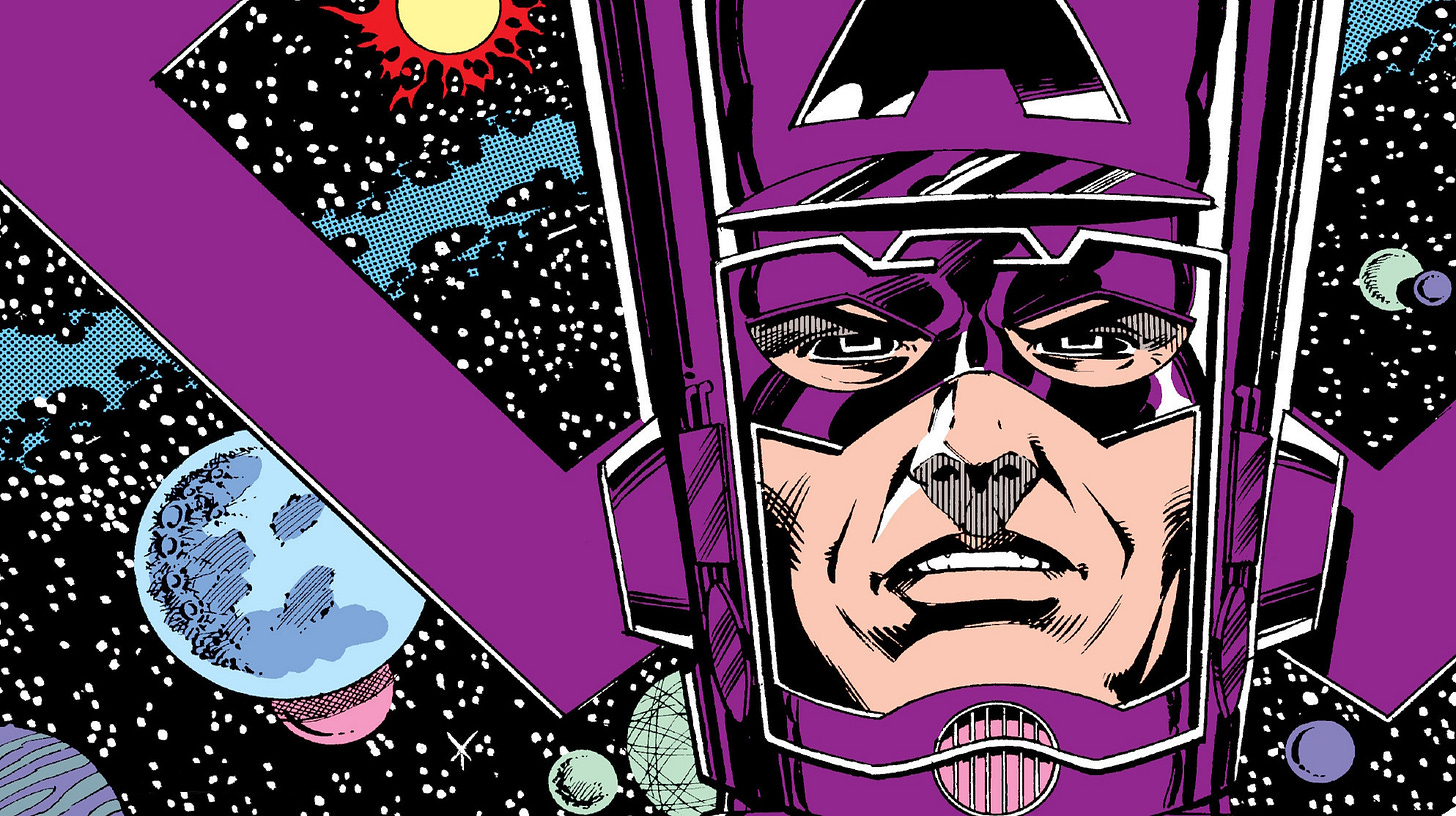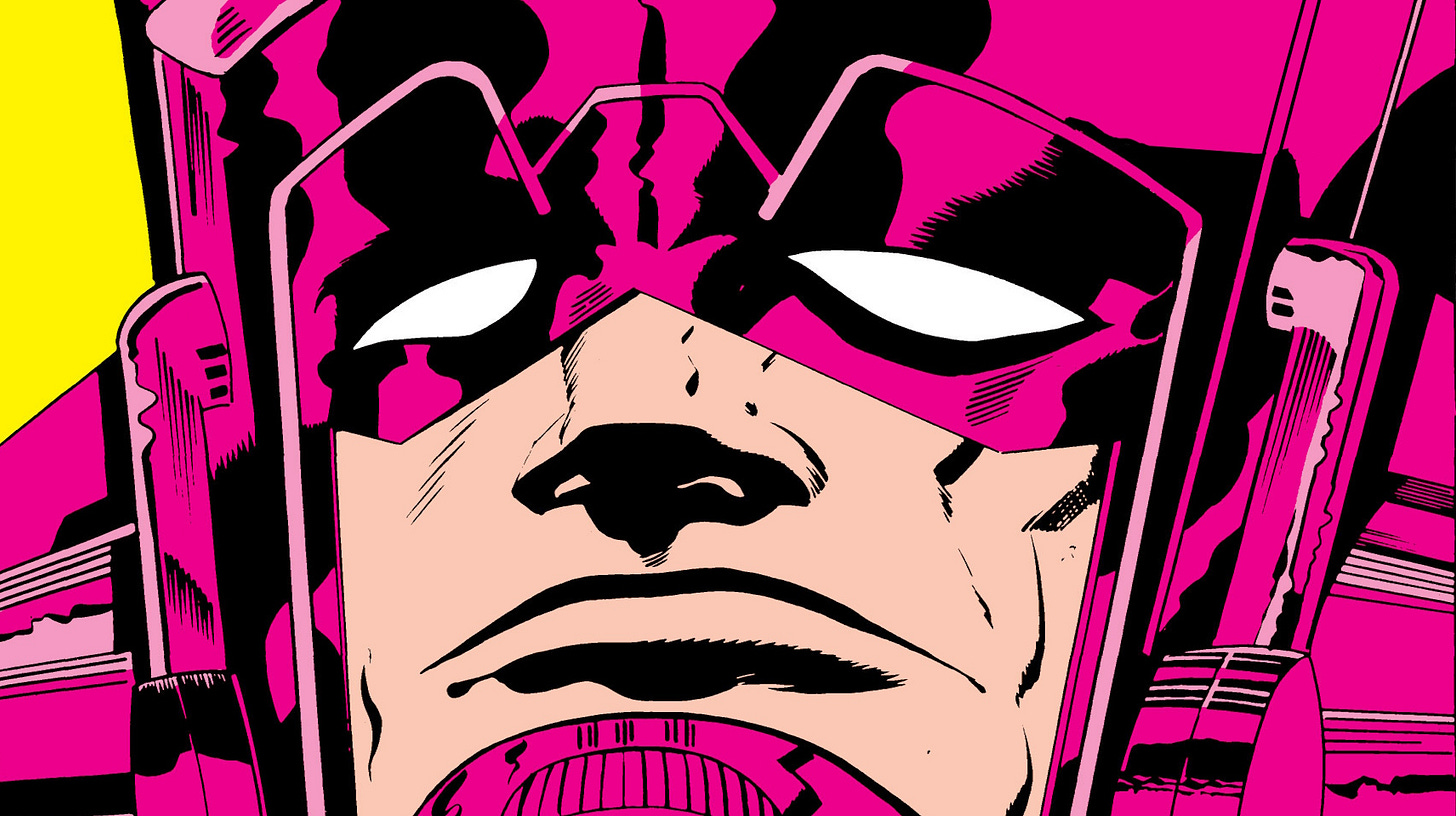Galactus: The Devourer of Worlds and Cosmic Enigma
Galactus is more than just a villain; he is a force of cosmic balance, existing beyond the simple dichotomy of good and evil. Both a force of unimaginable power and a character deserving sympathy.
Existing before the birth of the universe (in a slightly different form), Galactus is one of Marvel's most fascinating entities—a destroyer of worlds with a philosophical depth that transcends traditional comic book storytelling.
First Appearance and Origin Story
Galactus first appeared in the storyline famously known as The Galactus Trilogy in Fantastic Four #48-50. This landmark story arc, crafted by Lee and Kirby, introduced readers to a new kind of antagonist. Unlike any foe the Fantastic Four had faced before, Galactus was not driven by malice or a desire for conquest but by a fundamental need to survive. As a cosmic entity of immense power, Galactus consumes the life energy of entire planets to sustain himself, making him an existential threat to worlds across the universe.
The origin of Galactus is a tale steeped in cosmic lore. Originally, he was Galan, a mortal being from the previous universe that existed before the Big Bang. As his universe was collapsing, Galan merged with the sentience of the cosmos, becoming Galactus, the sole survivor of that cosmic cataclysm. This transformation, as detailed in Thor #169 (1969), turned him into a cosmic entity with god-like powers, destined to roam the universe in search of planets to consume. His existence is portrayed as a necessary evil—he maintains cosmic balance, even as his actions often lead to destruction on an unimaginable scale.
The Importance of Galactus in the Marvel Universe
Galactus is more than just a destroyer of worlds; he is a cosmic necessity. Within the Marvel Universe, he represents the delicate balance between creation and destruction. His role is to maintain this balance by consuming planets, which in turn prevents the universe from becoming overpopulated with life. This concept was explored in Fantastic Four 262 (1984), where Reed Richards is put on trial for saving the life of Galactus. The tribunal involves a consideration of Galactus are not inherently evil but a natural force essential to the universe's survival.
This nuanced portrayal elevates Galactus above typical comic book villains. He is not a character driven by personal vendetta or a lust for power; rather, he is driven by an existential hunger and an understanding of his role in the grand scheme of existence. This makes him a compelling character who defies easy categorization and challenges readers to think about the larger forces at play in the universe.
Key Relationships and Interactions
Throughout his storied history, Galactus has formed complex relationships with various characters in the Marvel Universe. One of the most significant of these is with the Silver Surfer, his first herald. Introduced in Fantastic Four 48 (1966), the Silver Surfer was once Norrin Radd, a noble being from the planet Zenn-La. To save his homeworld from destruction, Norrin Radd offered to become Galactus's herald, searching for uninhabited planets to satiate Galactus's hunger. This relationship is central to both characters' development, as it explores themes of sacrifice, redemption, and the morality of serving a cosmic force that brings death and destruction.
Another intriguing relationship is with Franklin Richards, the son of Reed Richards and Sue Storm of the Fantastic Four. Franklin, a being of immense power, once became the heir to Galactus’s power in a storyline that examines the cyclical nature of the cosmos and the idea that Galactus could serve as a mentor to a future cosmic entity. This storyline further cements Galactus’s role not just as a destroyer but as a pivotal figure in the cosmic hierarchy of the Marvel Universe.
Galactus also has a notable connection to Thanos, particularly during the "Infinity Gauntlet" storyline. While Galactus is not traditionally seen as a hero, he aligned himself with the Marvel Universe’s greatest heroes in an effort to stop Thanos, who had acquired the Infinity Gauntlet and posed a threat to the entire universe. This temporary alliance shows that Galactus’s interests can sometimes align with those of other cosmic beings, depending on the scale of the threat.
Interesting Storylines Involving Galactus
Galactus’s presence in the Marvel Universe has been the catalyst for numerous iconic storylines. Beyond his debut in “The Galactus Trilogy,” one of the most fascinating story arcs involving him is “The Ultimates” series from 2015-2016. In "Ultimates" 2 (2015), written by Al Ewing, Galactus undergoes a profound transformation from the Devourer of Worlds to the Lifebringer. This change occurs after the Ultimates, a team of cosmic heroes, intervene to alter Galactus's fundamental nature, shifting him from a force of destruction to one of creation. This storyline explores the concept of redemption and challenges the notion that Galactus is bound by his cosmic role.
Another notable storyline is “Galactus: The Devourer” (1999-2000), a miniseries focused on Galactus's psyche and the burden of his hunger. In this story, Galactus is portrayed as a tragic figure, consumed by his need to feed and the endless cycle of destruction it causes. It paints Galactus as a being tormented by his nature, adding a layer of pathos to his character.
The "Thor" series, particularly in the 2020 run by Donny Cates, features Galactus in another key storyline. In "Thor" #1 (2020), Thor becomes the new herald of Galactus, known as the Herald of Thunder, to help him combat a threat called the Black Winter. This storyline is significant because it showcases a unique alliance between two powerful entities, as Thor reluctantly agrees to assist Galactus, knowing the importance of the universe’s safety. It also highlights the ever-present threat Galactus represents, even when his goals align with those of other characters.
Galactus: A Cosmic Paradox
Galactus stands out in the Marvel Universe as a character who embodies the complexity of the cosmos itself. He is a cosmic paradox: a being who destroys to sustain life, a figure who is feared yet necessary. His stories often serve as a reminder of the delicate balance between creation and destruction, prompting readers to think about the vastness of the universe and the cosmic forces that govern it.




